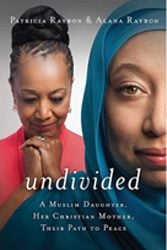Now Featured in the Patheos Book Club
Undivided: A Muslim Daughter, Her Christian, Mother, Their Path to Peace
I’ve read plenty of books about individual paths of spiritual discovery, but it is rare for me to come across a story like that of Patricia and Alana Raybon: a mother and daughter struggling to come to terms with their new interfaith relationship. Patricia, a Christian, is emotionally distraught upon learning that her youngest child has converted to Islam. Each woman documents her concerns, her struggles, and even prejudices in alternating chapters, drawing the reader into their ongoing quest for understanding, and above all, peace.
For me, reading this book was like reliving the struggle for understanding between my own mother and I as a fly on the wall. Like Alana, I was the dissident daughter who chose a different spiritual path from the rest of my family, but in reverse: I became a Christian in college after growing up Jewish. With fresh passion and zeal for my new faith, I longed for my parents to understand the love I had for Jesus, just as Patricia does for her daughter. At the same time, I understood their apprehension toward Christianity as a brand of politics than religion. My parents worried I would transform from a meek, well-mannered girl into a sign-carrying, fire-breathing, funeral-picketing lunatic with no regard for others’ personal boundaries, just as Patricia feared Islam’s association with global acts of terror.
Alana summarizes my feelings of conversion quite succinctly when she says, ““I didn’t choose Islam for the people…There are good things being done by Muslims in the world. But I’m tired of having to defend Muslims.” At times, it was frustrating to read Patricia’s segments; her occasional shortsightedness prevented her from recognizing the times when her own religion requires defending against extremism. The turning point for both mother and daughter was recognizing the boundaries and limitations of loving relationships: love is giving a child the freedom to spread her wings and make her own informed choices without coercion. Love is respecting personal boundaries by telling your grandchildren to ask their parents’ permission before taking them to church, no matter how painful it might be to do so. Love is resisting temptation to ask difficult questions to bait or guilt the other. Only when peace is the main objective can true understanding take place.
I didn’t expect to find complete resolution between mother and daughter by the end of the book. Truthfully, when it comes to religion, that is not always possible or realistic, especially when Islam’s interpretation of Christ’s crucifixion is that it didn’t actually happen. I believe there is only one solution for productive interfaith discussion when compromises cannot be reached: a promise to listen and learn. It is not loving to expect or compel someone to agree, but the willingness to listen above all else is indeed transforming, and I was pleased to see Patricia and Alana recognize that on their own terms.
The book flows smoothly and has a personal, journalistic feel, but is not without shortcomings. I wanted Alana to go more in-depth about her reasons for converting to Islam rather than comparing and contrasting the Islamic view of God with the Christian one. I found Patricia’s writing style choppy and often repetitive; her desire for Alana to re-convert was made known from the first pages and did not need to be repeated chapter after chapter, especially when Alana wrote how much that hurt her. That being said, a book like this could not be written without hurt feelings or bruised pride, and that takes guts. As an interfaith person myself, the willingness to parse through the conflict with honesty and deep reflection is admirable. I am curious to see how the mother and daughter fare in the future, perhaps when Alana’s children reach an age where they can decide for themselves what spirituality means to them.
Read an excerpt from Undivided, and an interview with the authors, at the Patheos Book Club here.
Beth Stoneburner is an author and blogger under the name Sarahbeth Caplin. Her memoir, Confessions of a Prodigal Daughter, recounts her journey from Judaism to Christianity, and was ranked #51 in Amazon’s top 100 books on personal growth in May 2015. She lives in Colorado with her husband and kittens, and is working on an MFA in Creative Writing at Colorado State. Visit her website at www.sbethcaplin,













